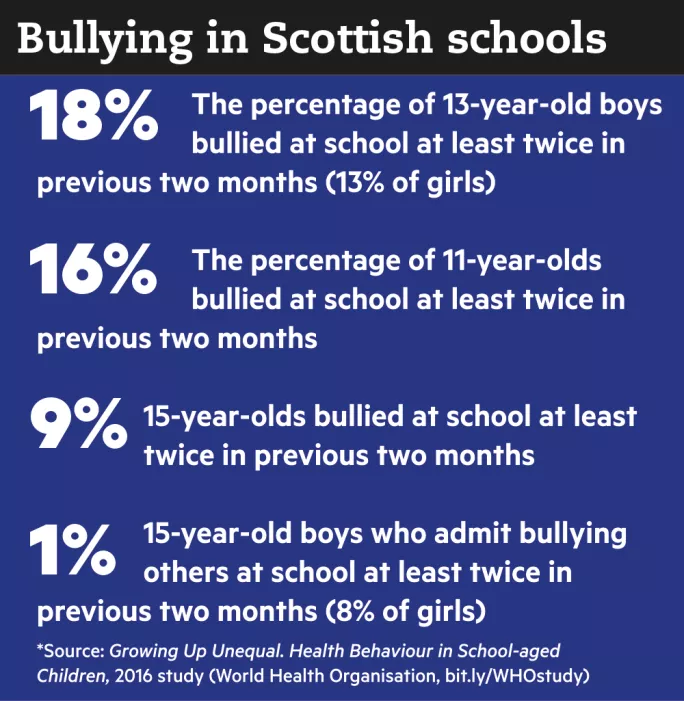Patchy approach to bullying ‘is failing vulnerable pupils’

Schools must improve “inconsistent” anti-bullying training for teachers, especially in light of new threats from social media, politicians have urged.
Schools are far less adept at tackling bullying than youth organisations such as the Scout Association, according to MSPs speaking at the Parliament’s Equalities and Human Rights Committee. The MSPs raised fears that inadequate training and inconsistent approaches left many teachers struggling to deal with bullying, a problem that was exacerbated by new threats to pupils’ safety from social media.
It has also emerged in the past week that 17 per cent of primary pupils and 39 per cent of secondary students surveyed by inspectors in 2015-16 did not agree that school staff were good at dealing with bullying.
If that accurately reflects Scotland’s entire state-school roll, around 180,000 pupils are not happy with approaches to bullying.
Christina McKelvie, committee convener, said that some teacher training and professional development was “inadequate” for dealing with bullying, and that various organisations shared such concerns, including Girlguiding Scotland, LGBT Youth Scotland and Time for Inclusive Education.
SNP MSP David Torrance, who is also one of Scotland’s most senior Scouts, argued that training for his organisation’s leaders was “far beyond” that offered in schools.
“If you walk into any Scout hall, you will see anti-bullying posters with all the steps that you have to take laid out,” said Mr Torrance. “How is it that we can do that, although we are all volunteers...with limited resources, yet the local authorities and private-sector organisations that have millions of pounds to spend cannot get the message across to schools?”
‘Not equipped’
Ms McKelvie said teachers were “not equipped” to deal with issues of homophobia or misogyny, which were, in contrast, raised by the likes of LGBT Youth Scotland and Girlguiding Scotland.
While some schools did “brilliant work”, some pupils had told her that personal and social education was “a moralistic judgement” on young people and a “waste of time”.
She feared pupils in minority groups might be vulnerable to self-harm or suicide, as many felt “backed into a corner and that their thoughts and feelings are not being respected”.
Conservative MSP Jeremy Balfour suspected that Scottish education was “so caught up in policies, strategies and highbrow thinking that the average class teacher …is simply not getting the training and help to do the things that we are discussing”. Mr Balfour found it “strange” that approaches to the recording of bullying could “vary dramatically” between schools and local authorities.
People are trying to do their best, but things can be improved
He said: “The danger is that some schools may be recording incidents well but are then being criticised for having too much bullying, whereas other schools do not record incidents and are not picking up on problems.”
Responding to the MSPs’ claims, education leaders conceded that there was room for improvement, particularly on the use of bullying data.
Mary Berrill, who leads on inclusion and equalities at Education Scotland, and revealed the figures on pupil satisfaction with schools’ anti-bullying work, said: “An inspector can go into a school where the headteacher has many brightly coloured folders...but the inspector cannot see the actions and impacts of the data, which are a very important aspect of an inspection.”

The director of the Scottish Catholic Education Service, Barbara Coupar, agreed that “inconsistencies” in anti-bullying training and policies were “perhaps preventing data from being available”. She added: “People are trying to do their best, but things can be improved.”
Philip Gosnay, of education directors’ body ADES, said: “Practice has to change. We can have all the policies we like but we need to have staff who are trained and confident in meeting the children’s needs.”
MSPs also heard about the need to refresh approaches to counteract bullying through social media. John Edward, director of the Scottish Council of Independent Schools, suggested that teachers were not clued up enough about how certain platforms worked.
“There is an assumption that data disappears from Snapchat and other [social media platforms], but there are ways of capturing quite a lot of that data if teachers and support staff are canny and know how to deal with it,” said Mr Edward.
You need a Tes subscription to read this article
Subscribe now to read this article and get other subscriber-only content:
- Unlimited access to all Tes magazine content
- Exclusive subscriber-only stories
- Award-winning email newsletters
Already a subscriber? Log in
You need a subscription to read this article
Subscribe now to read this article and get other subscriber-only content, including:
- Unlimited access to all Tes magazine content
- Exclusive subscriber-only stories
- Award-winning email newsletters